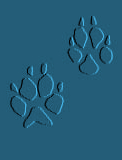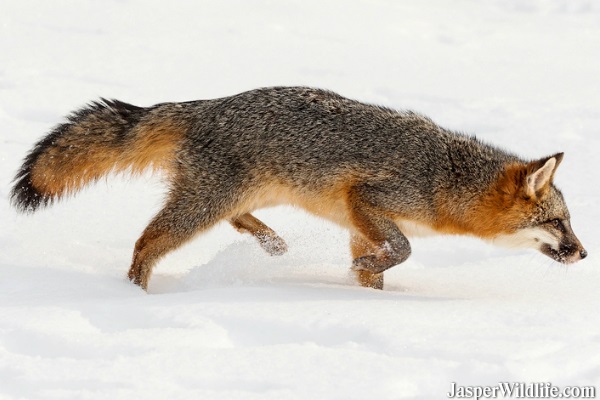(Urocyon cinereoargenteus) GRAY FOX
How large is Jasper Alberta's gray Fox?
- Mass: 3.6 to 6.8 kg
Length: to 3.5 ft. (1.1 m) - Wildlife living area: temperate forest & rainforest, temperate grassland, tropical scrub forest
Status: no special status.
Range:The gray fox occurs throughout most of the southern half of North America from southern Canada to northern Venezuela and Colombia. It does not occur in portions of the mountainous northwestern United States, the Great Plains and eastern Central America. - gray foxes resemble small, gracile dogs with bushy tails. They are distinguished from most other canids by their grizzled upperparts, buff neck and black-tipped tail. The skull can be distinguished from all other North American canids by its widely separated temporal ridges that form a U-shape. Males are slightly larger than females.
- gray foxes are unique among canids in their ability to climb trees. They have strong, hooked claws that allow them to scramble up trees to avoid predators or to get fruit. They descend primarily by jumping from branch to branch. gray foxes are nocturnal or crepuscular and den during the day in hollow trees, stumps or old woodchuck burrows. They are assumed to be monogamous; radio tracking data suggest that family groups maintain separate home ranges.
Where do gray Foxes Range?
Details on the gray Fox in Jasper
Gray foxes are found in deciduous woodlands, but are occasionally seen in old fields foraging for fruits and insects. Unlike the red fox (Vulpes vulpes), they do not prefer agricultural habitats.
Tracks are approximately 1 - 1.5 in. (3 - 4 cm.) Hind heel pad resembles inverted "V." Unlike the red fox, the gray fox's paws are not fur covered and the toe pads leave distinct impressions.

Gray Fox Tracks

